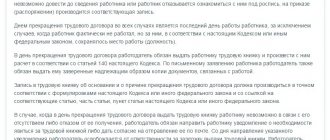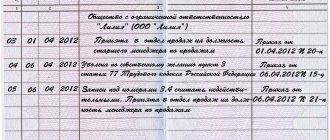Labor discipline at work is the basis on which the order of any organization rests. JCat.Work will help you figure out how an employee can violate it, and how the manager should respond to this.
Hiring for a person is not only about meeting a new team. One of the most important moments of “getting acquainted” with the company occurs when a new employee signs an agreement: it is in it that the obligation to strictly comply with the internal labor regulations is spelled out. The employee should study them in advance in order to sign the document with an understanding of all the nuances of the future work. Ignoring these rules cannot go unpunished, and improper implementation or complete non-compliance can lead to various types of penalties: from warning to dismissal.
Legal grounds
The main issues of compliance with labor discipline are spelled out in the Labor Code of the Russian Federation, however, some of its features can be determined by the management of the organization independently. They are listed in collective and labor agreements, as well as in local regulations of enterprises.
Note! Only the contents of internal corporate documents should be communicated to the employee upon employment, and the new employee must read the articles of the Labor Code independently without additional explanation.
The Labor Code of the Russian Federation does not have a precise explanation of the concept of “violation of labor discipline”. This term is used for convenience and a better understanding of the essence of what is happening. Instead, Article 192 of the Labor Code contains a definition of the term “disciplinary offense”, according to which we are talking about failure to perform or improper performance of labor duties by an employee with a note that such an action or inaction should be punishable.
Only documentary establishment of guilt gives the right to bring a person to justice. Evidence can be a memo, an explanatory note, an act of absence from work and other documents. If you skip this stage, punishing the employee will be a gross violation of the Labor Code.
Important! The law does not specify an exact list of violations for which an employee can be held legally liable.
The concept of labor discipline
What is work discipline?
According to Art. 189 of the Labor Code of the Russian Federation, labor discipline refers to the obligations of all employees of the organization to follow certain rules of behavior in the framework of their assigned work tasks.
The limits beyond which it is considered impermissible for an employee to go beyond are contained in the mentioned code, local acts of the enterprise, and an employment contract.
Labor discipline is defined as employee behavior that complies with legal norms, employment contracts and management orders that do not conflict with the above documents.
Depending on the degree of compliance with regulations and rules, there are:
- increased level of discipline;
- reduced level of discipline;
- insufficient level of discipline;
- standard (normal level of discipline).
When carrying out labor activities, employees must also observe production and technological discipline. Labor discipline is part of them; it is necessary to protect the enterprise from operational failures associated with the lack of raw materials, labor, necessary tools and materials.
The employer is responsible for compliance with production discipline; the responsibility of employees extends only to violations in the field of labor.
So, if an employee is obliged to report to the workplace (enterprise entrance) no later than 8.00, then his absence can be regarded as a violation of labor discipline.
Violation of labor discipline standards also includes an employee’s unauthorized departure from the workplace, a long lunch break, or untimely notification of management about incidents that have occurred if they caused the shutdown of a particular machine and the entire workshop.
At the same time, the employee cannot be held responsible for the enterprise’s lack of opportunities to purchase new equipment and prevent breakdowns of existing equipment.
Employees of the organization must be provided with the materials and tools they need, otherwise they will not be able to begin their work activities.
Technological discipline, in turn, assumes that if an employee has all the technological means of production necessary for an employee, he will adhere to the rules established in the organization.
Legal regulation
It is important to maintain work discipline.
The Labor Code of the Russian Federation, the Federal Law of the Russian Federation, as well as the employment contract concluded with the employer oblige employees of a particular enterprise to observe labor discipline.
Employees who violate established standards and regulations bear disciplinary liability for their actions. As a legal category, labor discipline presupposes mutual responsibility of both the employee and the employer.
In Art. 21 of the Labor Code of the Russian Federation indicates the need:
- Follow the labor responsibilities established by the employment contract;
- Compliance by employees with labor standards and regulations;
- Adhere to safety regulations;
- Showing care for the employer's property.
By presenting certain requirements for labor discipline, the employer is obliged to create appropriate conditions for employees.
Employees of the enterprise who do not comply with the labor regulations, who allow themselves to be negligent in their work and discipline, may be subject to disciplinary action. In turn, employees who observe labor discipline and take a responsible approach to fulfilling their assigned duties can be rewarded.
Encouragement and disciplinary action are a legal form of maintaining labor discipline at an enterprise.
All employees must understand that no offense goes unpunished and, conversely, no good deed goes unnoticed.
Employee obligations
The employment contract determines that each member of the team must unquestioningly fulfill their duties and observe labor discipline.
Do not forget that each field of activity has its own characteristics. For example, in state and municipal institutions additional restrictions may be introduced, while in corporations with a more free style of work they are kept to a minimum.
Among the basic rules that are heard in one way or another in almost any labor and collective agreement, we can highlight:
- compliance with the work schedule;
- fulfillment of their job descriptions and functional responsibilities;
- careful handling of the organization's property;
- compliance with the principles of subordination, rules of ethical behavior in the organization and relationships with colleagues.
The concept of a trade secret
Trade secrets are information protected by the state in areas such as scientific, technical, and technological activities. This category of data also includes financial and economic information. In other words, it is data of actual or potential importance.
The value of such information is usually determined by its absence from interested parties. Therefore, the legal owner has the right to restrict free access to them. The following information about the work of an individual entrepreneur is not a trade secret:
- data contained in the registration documents of the entrepreneur;
- data regarding the procedure for privatization of state-owned facilities;
- data regarding the use of budget funds;
- statements regarding violations of the law;
- data regarding environmental pollution. This also includes information on fire safety, information regarding the epidemiological situation, data regarding the radiation situation, information on food safety;
- statements regarding the wage system. This also includes information on occupational injuries, data on occupational diseases, as well as information on workplaces;
- data regarding debt on social payments;
- statements on the structure of income in non-profit organizations. This also includes information on the number of employees, the use of unpaid labor;
- statements that must be disclosed in accordance with the law.
The general procedure for access to trade secrets requires the prior consent of the employee. The exception is circumstances when this is directly provided for by job duties. Among other things, it must be recalled that the duty of secrecy continues to apply even after the termination of the employment relationship. The validity period of the assigned obligations is established by agreement of the parties. In case there was no such agreement, then a 3-year period is established after the termination of the employment relationship.
Types of labor discipline violations
All types of disciplinary offenses can be divided into three groups:
- Managerial. These include disobedience to the manager, failure to comply with his requirements, or failure to comply with subordination.
- Technological. This category of labor discipline violations is associated with non-compliance with technological standards and certain working conditions, which may result in an accident or violation of the requirements of technical regulations.
- Regime. One of the most popular categories, which is associated with non-compliance with established operating procedures of the enterprise.
The same article contains a separate list of disciplinary offenses by heads of organizations and accountants, due to which the cooperation agreement may be terminated:
- making an unreasonable decision that entailed negative consequences for the organization;
- gross violation of discipline - it is enough for a manager to be seriously “fineed” once to be at risk of dismissal.
For disclosure of trade secrets
One of the additional reasons for unilateral termination of labor relations may be the disclosure of state secrets. Naturally, the obligation to non-disclose classified information is formalized properly, with this fact reflected in the employment agreement. The fact of disclosure is established solely by a court decision.
What does state secret mean? These are statements protected by the state in such areas as military, foreign policy, and economic activities. This category of data also includes operational-search information. In other words, this is data, the dissemination of which could cause a deterioration in the security of the state. The admission procedure involves:
- registration of non-disclosure obligations;
- selective restriction of rights;
- registration of consent to carry out inspections;
- establishing a procedure for providing social guarantees;
- study of legislative (regulatory) acts;
- decision making by the responsible person regarding admission.
An employment agreement reflects the mutual obligations of the parties. Therefore, it is prohibited to conclude it until the results of the initial inspection are received. Among other things, commercial secrets fall under state protection, the disclosure of which is subject to similar liability. Commercial information includes statements that allow the owner to increase income, maintain positions, and receive other benefits.
"Crime and Punishment"
Any violation of labor discipline by an employee may cause a response from the employer. As an instrument of influence, the manager can apply any measure specified in the Labor Code of the Russian Federation.
The document contains three options for punishing an employee - reprimand, reprimand and dismissal. The first two of them, according to Article 192 of the Labor Code of the Russian Federation, are combined into the concept of “disciplinary sanctions”.
Note! Several types of penalties cannot be applied to one offense at the same time.
The choice of response is influenced not by the mood of the boss or the personal qualities of the employee: the severity of the penalty for violation of labor discipline directly depends on the nature of the offense.
In some situations of gross violations, the administration reserves the right to immediately dismiss the employee. Also, any two disciplinary sanctions within a calendar year may be grounds for dismissal.
The disciplinary procedure is not carried out in one stage. The algorithm includes at least three steps:
- recording an offense - drawing up a document that confirms the fact of violation of labor discipline by the employee;
- employee’s explanation – the request for an explanatory note is delivered by registered mail against a signature confirming receipt, after which the employer waits for a response from the violator within 2 days;
- issuing an order for a reprimand or reprimand.
If we are talking about dismissal, this algorithm is also supplemented by issuing a corresponding order, familiarizing the employee with it under his signature and entering information about the dismissal in the work book.
The Labor Code excludes the possibility of applying penalties that are not specified in Article 192. Therefore, any “independent activity” of the employer in this matter will be illegal: it is impossible to deprive a bonus or issue a fine for non-compliance with labor discipline. However, the administration may exercise the right to determine the procedure for bonuses, stipulating in the regulations that for failure to fulfill duties, the employee may lose monetary incentives.
The procedure for bringing to disciplinary liability
Depending on the severity of the offense committed, an employee of the organization may be subject to general or special disciplinary liability.
General disciplinary responsibility
Three types of disciplinary punishments.
General disciplinary liability affects all employees of the organization; its action is enshrined in the Labor Code of the Russian Federation and internal regulations. As a punishment for demonstrated incompetence, an employee may:
- receive a remark;
- receive a reprimand (the Labor Code of the Russian Federation previously had such a measure of bringing to responsibility as a severe reprimand);
- be dismissed on the basis of Art. 192 Labor Code of the Russian Federation.
The chosen form of disciplinary action depends on the severity of the offense committed, the circumstances, the employee’s work experience and any comments he or she already has. The final choice of disciplinary measures depends on the employer.
Thus, one employer may fire an employee for being 10-15 minutes late for work, while another will make just a small reprimand against the employee for the same lateness.
The specified list of penalties is exhaustive. The employer is not allowed to use penalties other than those contained in the Labor Code of the Russian Federation and federal laws.
Example. The employee did not report his illness in advance, bringing in sick leave only after the end of his sick leave. As a result of his negligence, the employer spent a whole day searching for a replacement. When receiving wages, the time spent searching for a new employee was deducted from the salary.
As a result, the employee received less wages than what he expected. The employer’s actions in this case are illegal, since they do not take into account the suddenness of the illness, which is mentioned on the sick leave certificate, and the employee’s inability to contact his immediate superiors from the hospital.
The only possible punishment would be a reprimand, but not withholding wages.
What's the result?
To maintain discipline in the organization, it is necessary to familiarize the new employee with the peculiarities of internal procedures immediately upon employment. It is important that he read the labor and collective agreements, which indicate the specifics of the organization’s operating mode, requirements for employees, as well as penalties for violations of labor discipline by the employee.
In practice, disciplinary violations are inevitable: there is hardly an enterprise where no one, for example, has ever been late for work. Therefore, you need to be well versed in the intricacies of what is considered a labor misconduct, what types of sanctions an employer can or should apply in different situations.
Responsibilities of employers aimed at ensuring labor discipline
The employer also has a certain range of responsibilities for ensuring labor discipline:
- creating conditions for the employee to perform job duties
- ensuring labor protection
- supply of necessary equipment and tools
- providing equal opportunities for remuneration of employees
- full and timely payment of wages
- encouragement for conscientious performance of labor duties and punishment for their violation
- compulsory social insurance for all employees
- compensation for damage caused during the performance of duties by an employee
One of the mandatory local acts is the Internal Labor Regulations. They are approved by the employer, but the provisions of the Rules must not contradict the mandatory requirements and rules.
How is a violation formalized?
The employer should follow the procedure for documenting the violation and be careful about the deadlines. Otherwise, the punishment may be challenged in court.
An order for disciplinary action may be issued no later than one month from the date of discovery of the offense and no later than six months from the date of its commission. It should be taken into account that this time does not include periods during which the employee was absent from the workplace for valid reasons - see Art. 193 Labor Code of the Russian Federation.
- When applying for employment, a citizen must familiarize himself with the rules of labor discipline at the enterprise by signature.
- The offense must involve the fault of the subordinate.
- The fact of violation must be documented using an act, which is drawn up in the presence of two witnesses and signed by them.
- The director is obliged to demand an explanatory statement from the employee, which he must provide within two days. In case of refusal to give explanations, an appropriate act should be drawn up.
- The order to punish the employee must be read and signed. This must be done no later than three working days from the date of its publication. In case of refusal to sign a document, this fact should be reflected in the act.
Penalties imposed in the form of a reprimand or reprimand are valid for exactly one year from the date of their issuance. In some cases, by decision of the employer, the penalty may be lifted before the expiration of this period.
Employees who believe that they have been punished unfairly can appeal the employer's decision by filing a lawsuit in court.
The meaning, goals and objectives of labor discipline
Labor discipline ensures the effective functioning of the organizational structure. Following established procedures creates a productive and working environment within the team.
Goals pursued by norms of behavior:
- increasing the efficiency coefficient of both the individual and the working community;
- improving the quality characteristics of products/services while maintaining productivity levels;
- rational use of temporary resources;
- creating and maintaining a comfortable and safe work process for each employee;
- high-quality integration with related disciplines, labor protection.
The main goal of maintaining labor discipline is to achieve the maximum level of productivity and minimize possible incidents in the organization.
Rules and varieties
An employee of any public or private organization is obliged to:
- Respect and follow the internal rules of the company.
- Carry out direct job responsibilities efficiently.
- Comply with labor safety rules and work schedules regulated by the Labor Code of the Russian Federation.
- Work and follow the Regulations on non-disclosure of trade secrets and other regulatory legal acts of local significance.
- Take care of the integrity of the organization’s property balance.
- Inform the manager about the occurrence of an emergency situation that threatens the health and life of subordinates.
Types of labor discipline are considered in different planes. It is customary to distinguish between: technological, educational, budgetary, financial and accounting. Each variety is applicable in its own area and has a number of specific features.









